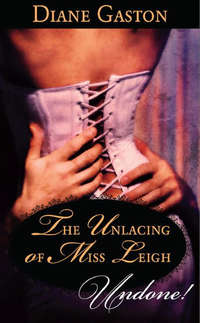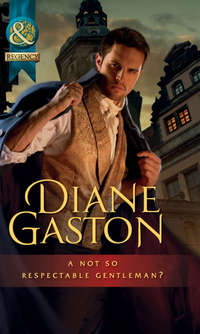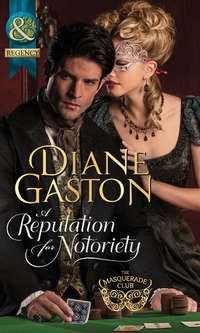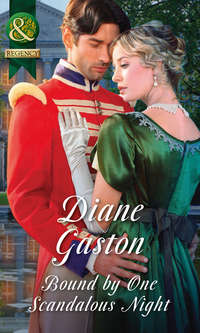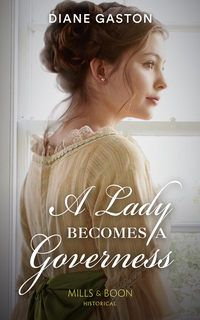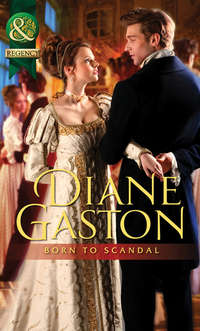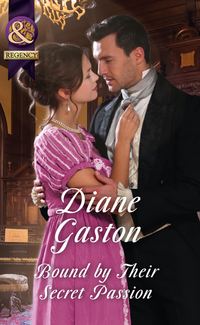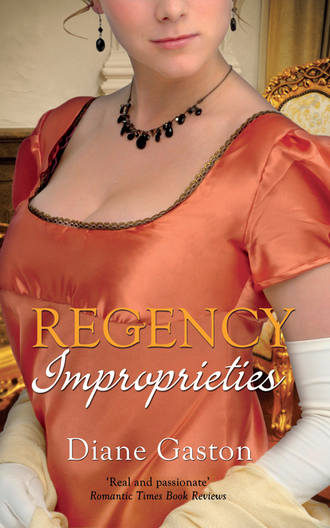
Полная версия
Regency Improprieties: Innocence and Impropriety / The Vanishing Viscountess

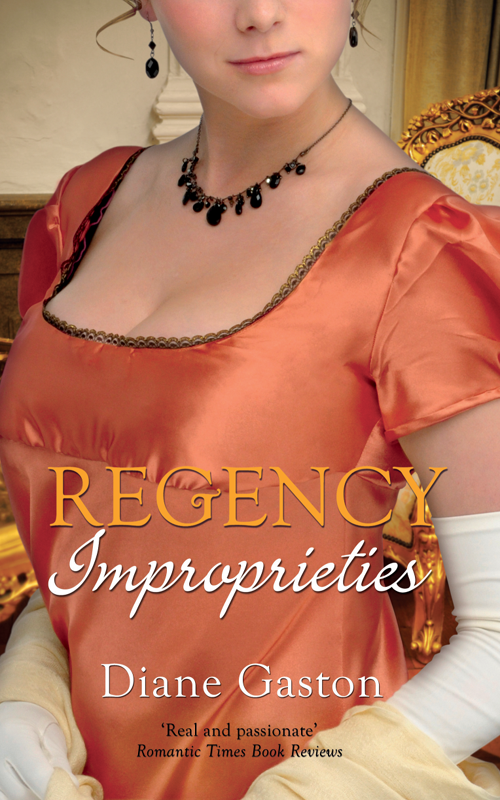
Don’t miss these other Regency delights from Mills & Boon® Historical romance’s bestselling authors!
REGENCY PLEASURES
Louise Allen
REGENCY SECRETS
Julia Justiss
REGENCY RUMOURS
Juliet Landon
REGENCY REDEMPTION
Christine Merrill
REGENCY DEBUTANTES
Margaret McPhee
REGENCY IMPROPRIETIES
Diane Gaston
REGENCY MISTRESSES
Mary Brendan
REGENCY REBELS
Deb Marlowe
REGENCY SCANDALS
Sophia James
REGENCY MARRIAGES
Elizabeth Rolls
REGENCY INNOCENTS
Annie Burrows
REGENCY SINS
Bronwyn Scott
About the Author
As a psychiatric social worker, DIANE GASTON spent years helping others create real-life happy endings. Now Diane crafts fictional ones, writing the kind of historical romance she’s always loved to read.
The youngest of three daughters of a US Army Colonel, Diane moved frequently during her childhood, even living for a year in Japan. It continues to amaze her that her own son and daughter grew up in one house in Northern Virginia. Diane still lives in that house with three very ordinary housecats. Visit Diane’s website at http://dianegaston.com
REGENCY
Improprieties
Innocence and Impropriety
The Vanishing Viscountess
Diane Gaston

www.millsandboon.co.uk
Innocence and Impropriety
Diane Gaston
To the ‘Roses’ in my life:
My sister, Marilyn Rose
(though she was never fond of her middle name)
and my sister-in-law, Rosemarie
Chapter One
London—July 1817
Vauxhall Gardens was not a place Jameson Flynn would have chosen to spend his night hours, but his employer, the Marquess of Tannerton, required his presence.
To Flynn, Vauxhall was all façade. Mere wooden structures painted to look like Greek temples or Chinese pavilions. Revellers were equally as false, wearing masks to disguise whether they be titled, rich, respectable, or rogue, pickpocket, lady of ill repute.
‘Have some more ham.’ Tannerton handed him the plate of paper-thin ham slices, a Vauxhall delicacy of dubious worth.
Rich as Croesus, Tanner—as he liked to be called—ate with as much enthusiasm as if he were dining at Carlton House instead of a supper box at Vauxhall. Flynn declined the Vauxhall delicacy but sipped his arrack, a heady mixture of rum and Benjamin flower that redeemed Vauxhall only a little in his eyes. It was not unusual for Tanner to seek Flynn out for companionship, but Flynn had no illusions. He was Tanner’s secretary, not his friend.
To look at them, you might not guess which one was the marquess. Flynn prided himself on his appearance. His dark brown hair was always neatly in place, his black coat and trousers well tailored. Tanner, a few years older and lighter in colouring, took less care, often giving the impression he’d just dismounted from his horse.
Flynn placed his tankard on the table. ‘You brought me here for a purpose, sir. When am I to discover what it is?’
Tanner grinned and reached inside his coat, pulling out a piece of paper. He handed it to Flynn. ‘Regard this, if you will.’
It was a Vauxhall programme, stating that, on this July night, a concert of vocal and instrumental music would be performed featuring a Miss Rose O’Keefe, Vauxhall Garden’s newest flower.
Flynn ought to have guessed. A woman.
Ever since returning from Brussels, Tanner had gone back to his more characteristic pursuits of pleasure in whatever form he could find it. Or, Flynn might say, from whatever woman. And there were plenty of women willing to please him. Tanner had the reputation of being good to his mistresses, showering them with gifts, houses, and ultimately a nice little annuity when his interest inevitably waned. As a result, Tanner usually had his pick of actresses, opera dancers and songstresses.
‘I am still at a loss. I surmise you have an interest in this Miss O’Keefe, but what do you require of me?’ Flynn usually became involved in the monetary negotiations with Tanner’s chère amies or when it came time to deliver the congé, Tanner having an aversion to hysterics.
Tanner’s eyes lit with animation. ‘You must assist me in winning the young lady.’
Flynn nearly choked on his arrack. ‘I? Since when do you require my assistance on that end?’
Tanner leaned forward. ‘I tell you, Flynn. This one is exceptional. No one heard of her before this summer. One night she just appeared in the orchestra box and sang. Rumour has it she sang again at the Cyprian’s Masquerade, but that is not certain. In any event, this lady is not easily won.’
Flynn shot him a sceptical expression.
Tanner went on, ‘Pomroy and I came to hear her the other evening. You’ve never heard the like, Flynn, let me tell you. There was nothing to be done but try to meet her.’ He scowled and took a long sip of his drink. ‘Turns out she has a papa guarding her interests. I could not even manage to give the man my card. There were too many ramshackle fellows crowding him.’
Flynn could just imagine the top-lofty marquess trying to push his way through the sorts that flocked around the female Vauxhall performers. ‘What is it you wish of me?’
Tanner leaned forward eagerly. ‘My idea is this. You discover a way to get to this father and how to negotiate on my behalf.’ He nodded, as if agreeing with himself. ‘You have the gift of diplomacy, which you know I do not.’
Flynn suspected all the negotiating required was to have said, ‘How much do you want?’ and the lady would have fallen, but he kept that opinion to himself. He would act as broker; he’d performed such tasks for Tanner before, but always after Tanner made the initial conquest. The way Flynn looked at it, he was negotiating a contract, not so different from other contracts he negotiated for Tanner. Flynn negotiated the terms, the limits, the termination clause.
The orchestra, playing some distance from their supper box, its strains wafting louder and softer on the breeze, suddenly stopped. Tanner pulled out his timepiece. ‘I believe it is about time for her to perform. Make haste.’
Flynn dutifully followed Tanner’s long-legged stride to the Grove in the centre of the gardens where the two-storeyed gazebo held the orchestra high above the crowd. Tanner pushed his way to the front for the best view. He was filled with excitement, like a small boy about to witness a balloon ascent.
The music began, a tune familiar to Flynn, and, amid cheers and applause, Miss O’Keefe took her place in front of the orchestra. She began to sing:
When, like the dawning day
Eileen Aroon
Love sends his early ray …
Her crystalline voice filled the warm summer air, silencing the revellers. Flynn lifted his gaze to her and all the glittering lamps strung on the gazebo and throughout the surrounding trees blurred. Only she filled his vision, dressed in a gown of deep red that fluttered in the light breeze.
Her hair, dark as the midnight sky, dramatically contrasted with skin as pale as clouds billowing over mountaintops. Her lips, now open in song, were as pink as a summer garden’s rose.
This was Rose O’Keefe, Vauxhall’s newest singing sensation? She seemed more like some dream incarnate. Flynn watched as she extended her arms towards the audience, as if to embrace them all. Hers was a graceful sensuality, but earthy and deeply arousing.
Were she no longer true
Eileen Aroon
What would her lover do …
Flynn swallowed against a sudden tightness in his throat. The Irish tune—’Eileen Aroon’—sung with the tiniest lilt, created a wave of emotion such as he’d not felt in years. He squeezed shut his stinging eyes and could almost see his mother at the old pianoforte, his father by her side, his brothers and sisters gathered around. He could almost hear his father’s baritone booming loud and his sister Kathleen’s sweet soprano blending in harmony. He could almost smell the rich earth, the fresh air, the green of home.
He’d not crossed the Irish Sea in the ten years since he’d sailed for Oxford, filled with ambition, but this singing temptress not only aroused his masculine senses, but also gave him an aching yearning for just one evening of song, laughter, and family.
‘Is she not all I said she would be?’ Tanner nudged him on the shoulder, grinning like a besotted fool.
Flynn glanced back to her. ‘She is exceptional.’
… Never to love again … Eileen Aroon …
Tanner also gaped at Rose O’Keefe, unmindful that his frank admiration showed so plainly on his face. Flynn hoped his own reaction appeared more circumspect, even though the heat of frank desire burned more hotly with each note she sang.
She seemed to represent all Flynn had left behind. Country. Family. Joy. Pleasure. It made him wish he’d answered his mother’s monthly letters more than three times a year, wish he could wrap his arms around her and his father, roughhouse with his brothers, tease his sisters. He missed the laughter, the gaiety. How long had it been since he’d laughed out loud? Embraced a woman? Sung ‘Eileen Aroon’?
Flynn’s ambition had driven him away from his past. He’d been the marquess’s secretary for six years, but the position was a mere stepping stone. Flynn aimed to rise higher, in government, perhaps, or—his grandest aspiration—to serve royalty. Tanner supported his goals, taking Flynn with him to the Congress of Vienna and to Brussels, where powerful men learned Flynn’s name and recognised his talent. The marquess assured him the time would soon come for a position suitable to Flynn’s ambitions.
Which was why Flynn was shocked at his reaction to Rose O’Keefe. She propelled him back, not forwards, and her clear, poignant voice left him very aware of his manhood. Carnal desire and thoughts of home made an odd mixture indeed, and a thoroughly unwanted one. Still, at the moment, he seemed helpless to do anything but let her voice and vision carry him away.
Later he would plant his feet firmly back on the ground. He must, because this woman who had temporarily aroused his senses and unearthed a buried yearning for home was also the woman he must procure for his employer.
Rose glanced down at the crowd watching her, so silent, so appreciative! Her audience had grown larger with each performance, and she had even been mentioned favourably in the Morning Chronicle. She loved hearing her voice rise above the orchestra, resounding through the summer night air. The magic of Vauxhall seemed to charm her as well, as if singing an Irish air in this fanciful place were merely some lovely, lovely dream.
Mr Hook himself watched from the side of the balcony, smiling in approval. Rose tossed the elderly musical director a smile of her own before turning her attention back to her audience. She was so glad Miss Hart—Mrs Sloane, she meant—had seen her perform before leaving for Italy on her wedding trip. Rose’s brief time living with Miss Hart had taught her many lessons, but the one she treasured most was to be proud of who she was. And Rose was very proud this day. Proud enough to feel all her dreams were possible. She believed that some day she would be the celebrated singer all of London raved about. She would sing at Covent Garden, at Drury Lane or—dare she hope?—King’s Theatre.
Rose scanned her audience again. Most of the faces lifted toward her in admiration were masculine ones. Since she’d been ten years old, men had been staring at her. At least now she knew how to hold her head up and be unafraid of their frank regard. She’d learned how to talk to gentlemen, how to encourage their interest—or, more importantly, how to discourage it.
Rose’s eye was drawn to two gentlemen in the audience below her. They stood close to the balcony, so that the lamps illuminated them. One was very tall, at least as tall as Mr Sloane, but it was not he who drew her attention as much as the one who stood so still, gazing up at her. This man’s rapt expression made her heart skip a beat.
She sang the last bar.
Truth is a fixed star. Eileen Aroon …
Applause thundered skywards as the music faded. Rose stole a peek at the gentleman who had captured her interest. He continued to stand, statue-still, his eyes still upon her. She felt her cheeks go warm.
She bowed and threw a kiss, eyes slanting towards her quiet admirer, before beginning her next song. As she continued through her performance, her gaze roved over all her admirers, but her eyes always returned to him.
Soon the orchestra began her final tune of the evening, ‘The Warning’.
‘List to me, ye gentle fair; Cupid oft in ambush lies …’ Rose began softly, animating her facial expressions and her gestures. ‘Of the urchin have a care, Lest he take you by surprise …’
She let her voice grow louder and had to force herself not to direct the song at the mysterious gentleman, who still had not moved. She could neither distinguish his features nor see what colour were his eyes, but she fancied them locked upon her, as she wished to lock hers upon him.
Flynn tried to shake off his reaction to Rose O’Keefe, tried to tell himself she was merely another of Tanner’s many interests, but he could not make himself look away from her. Had his grandfather been standing next to him and not in his grave these last twenty years, he’d have said, ‘‘Tis the fairies t’blame.’
Perhaps not fairies, but certainly a fancy of Flynn’s own making. It seemed to Flynn that Rose O’Keefe was singing directly to him.
An illusion, certainly. There could be nothing of a personal nature between him and this woman he had not yet met. All he experienced while listening to her was illusion, as fanciful as believing in fairies. His role was clear. He must approach Miss O’Keefe’s father and convince the man to allow him to plead Tanner’s suit directly to the daughter. Perhaps he would also be required to deliver gifts, or to escort her to Tanner’s choice of meeting place. He’d performed such errands in the past without a thought.
It was unfortunate that this rationality fled in the music of her voice, the allure of her person. She sang of Cupid, and Flynn understood why the ancients gave the little fellow an arrow. He felt pierced with exquisite pain, emotions scraping him raw.
With one more refrain, her song ended, and, as she curtsied deeply to the applause that erupted all around him, he roused himself from this ridiculous reverie.
‘Bravo!’ shouted Tanner, nearly shattering Flynn’s eardrum. ‘Bravo!’
A moment later she had vanished as if she’d been only a dream. Tanner clapped until the principle performer on the programme, Charles Dignum, began singing.
Flynn stared at Tanner, feeling suddenly as if this man who employed him were Cromwell come to seize his lands and take his woman, an even more ridiculous fancy. Flynn’s mother was English, though she’d spent most of her life in Ireland. He had as much English blood in his veins as Irish. What’s more, Flynn embraced his Englishness. England was where his life was bound. England was where his ambitions lay.
He shook his head, trying to rid himself of this madness. Rose O’Keefe had been a mere fleeting reminder of home, nothing more.
He pressed his fingers against his temple. He would soon recover his sanity and return to serving Tanner with dispassionate efficiency.
But as Tanner grabbed his arm and led him back to the supper box, the sweet voice of Rose O’Keefe lingered in Flynn’s ear, an echoing reverie:
List to me, ye gentle fair; Cupid oft in ambush lies …
Chapter Two
Rose peeked through the curtain at the throng of men outside the gazebo, some carrying flowers, others waving their cards, all calling her name. There were so many, she could not see them all. If he was there, the man who had watched her with such rapture, she could not see him.
She turned to her father. ‘There are more tonight.’
‘Are there now, Mary Rose?’ Her father placed his oboe in its case.
The woman at his side, a robust creature with ample dé-colletage—the woman who shared his bed—added, ‘We have our pick, I’d say.’
Rose frowned. ‘I do not wish to pick, Letty. I am content merely to sing.’
She had known nothing of Letty Dawes when Rose had surprised her father by appearing on his doorstep four months ago. The letters her father had sent to her at the school in Killyleagh made no mention of Letty, but then his letters had never been very informative.
Her father had been very surprised and perhaps somewhat disappointed to see that Rose had come to London with the ambition to sing. He had always told her to stay in Ireland, to remain at the school he’d sent her to after her mother died, the school that had kept her on as a music teacher. But teaching was not for her. Rose burned with the passion to perform, to sing.
Like her mother.
Rose’s most treasured memories were of sitting by her mother’s sickbed, listening to her tales of the London stages, the excitement of the music, the lights, the applause, the glory of her finest hour, performing at the King’s Theatre. Even seven years of schooling and four more of teaching could not extinguish the fire that had been ignited so early within Rose to follow in her mother’s footsteps. Rose had saved her pennies until she had enough to make the journey to London.
But any fantasies she’d had about a loving reunion with her father had been thoroughly dashed in those first few minutes of his surprised hugs and kisses. Letty Dawes had appeared from behind him, lamenting the sacrifices they would have to make to house and feed her, laughing at her desire to sing on the London stage. What theatre would employ an Irish country lass? Letty had said.
At first Rose thought her father had married again, but her father explained that entertainers lived by different rules from those she learned in school. He and Letty did not need marriage to share a bed. Then her father offered to pay Rose’s way back to Ireland, and Letty exploded in rage at how much it would cost. A huge row broke out between them, and Rose walked out to escape hearing it, knowing she had caused it. She was glad now that she had walked out, because otherwise she would never have met Miss Hart.
It was Miss Hart who brought her to Vauxhall Gardens that glorious night when Rose had another tearful reunion with her father, and he introduced her to Mr Hook. Mr Hook let her sing one song and, seeing as she was not yet twenty-one, asked her father if he might hire her. So when it came time to leave Miss Hart’s house, Rose returned to her father and Letty, who suddenly perceived her as a source of more income. To sing at Vauxhall, Rose would endure anything, even living with Letty.
It seemed she must also endure this frenzy of interest from gentlemen, all pressing her father to meet her. It was all part of the profession, her father told her.
He glanced out of the window. ‘Perhaps there will be some titled gentlemen among these fellows. That is who you must court if you wish to move ahead.’
‘Yes, indeed,’ Letty added, putting an arm around Rose’s shoulders as if in affection. ‘A titled gentleman would be grand. There is no telling how much you might make, Rose. Why, some men even buy houses for their.’
Rose wrenched away. She knew much more about what men expected of women who performed on stage than she had when she first arrived in London. But what of love? Of romance? That was what Miss Hart had found with her Mr Sloane. That was what Rose coveted for herself.
‘What men are expecting in exchange for those houses, I have no wish to give,’ she told Letty.
Letty broke into shrill laughter. ‘Give? If you don’t give it, men will just take it anyway. Better to profit, I always say.’
Her father walked up to her and tweaked her chin. ‘Never fear, Mary Rose.’ He spoke gently. ‘Your papa will make certain you are set up like a fine lady. I wouldn’t let my little girl go with some penniless rogue, now would I?’
Rose pressed her hand against her throat. All part of the profession, her father had told her.
He hurried away, and she heard him shout, ‘Give me your cards, gentlemen.’ before the door closed behind him.
Letty shook a finger at her. ‘You obey your father. He has your best interests at heart.’
To escape having to talk to her further, Rose peered through the curtain. The men outside flocking around her father appeared spectre-like in the dim light, like a flock of bats in a moonlit sky. She shivered. She loved her newfound singing success. After Vauxhall’s season was over, she was certain she could find more employment. She could support herself. She could afford to wait for love to find her.
Rose gripped the curtain in determined fingers. Until she discovered for herself the sort of true love she’d witnessed at Miss Hart’s, she must merely sing her songs and fend off all other plans her father and Letty had for her.
As she stared through the gap in the curtain, she wondered if one of the shadowy figures would materialise into the man who’d drawn her attention when she’d performed. Would he be the one? she wondered. The one who might love her? But as her father collected the cards and gifts, she didn’t see anyone who could be him.
Letty walked up behind her and opened the curtain wider. ‘Your father is a smart man to put them off. They’ll be willing to pay more if they must wait to win you.’ She paused as if wheels turned slowly in her head. ‘But not too long. Too much waiting and they will lose interest.’
Her father’s arms were filled with small packages and bouquets of flowers. One hand was stuffed with cards. He turned to come back in, but another man stepped forward. Rose could not make out the man distinctly in the dim light, but he was dressed in a dark coat and seemed of similar size to her man in the audience.
She had a melting feeling, like when she’d watched Miss Hart with her Mr Sloane.
Her father and the shadowy gentleman spoke a few words before the man bowed and walked away, and her father re-entered the gazebo.
He dropped the heaps of fragrant flowers and small, ribbon-wrapped packages on to a nearby table and turned to Rose. ‘Mary Rose, pull this last card from my hand.’
She pulled the card sticking out from the stack and read, ‘The Marquess of Tannerton.’
He let the other cards cascade on to the table. ‘I told the fellow he could call tomorrow at four o’clock.’
Letty’s eyes lit up. ‘That was the Marquess?’
‘I’m not sure of it.’ Her father smiled sheepishly. ‘I was half-stunned, to be sure. Didn’t heed what the fellow said, but I heard “marquess” and told the man he could call.’ He gave Rose a patient look. ‘You must see a marquess, Mary Rose.’
It should hearten her that the marquess might be the man who so captivated her, but somehow it did not. Whatever could exist between a marquess and a songstress would not be love.
Rose sighed. She would just have to discourage this man. She was confident she’d learned enough about gentlemen to fend off unwanted attention. Her priority at the moment was to finish out her summer singing at Vauxhall, and to have Mr Hook put her forth with the highest recommendations to others who might hire her. Rose wanted to keep singing, perhaps on a proper stage this time, part of a real theatre. She wanted to rise some day to the principal roles, to have her name always in the newspapers, her image on playbills, theatre managers clamouring for her to sing for them.


